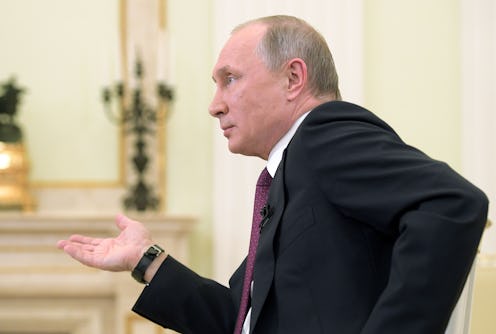News
Russia Hacking Allegations Have Loose Ends To Tie
Ever since Donald Trump became the president-elect, many have been trying to figure out how exactly that happened, and more recently, how Russia allegedly could have interfered in the presidential election. On Dec. 9, The Washington Post reported that a CIA assessment accused Russian hackers of allegedly trying to muddy the waters of American democracy, while also supposedly attempting to tip the scale to help Trump get elected. Since then, updates on the Russia election hacking allegations involve Democratic electors' growing demand for an intelligence briefing on the matter. Additionally, The New York Times reported on Dec. 13 that alleged Russian hacking could have interfered in Democratic House races, as well.
NBC News reported on Dec. 15 that two senior U.S. Intelligence officials have now discovered information that suggests Vladimir Putin had a personal involvement in how information that the hackers found from Democrats was leaked to the public and used in the election. During a Moscow business forum, Putin firmly rejected the early allegations: "They started this hysteria, saying that this (hacking) is in Russia's interests. But this has nothing to do with Russia's interests."
However, specific updates on the alleged hacking itself are scarce, because very little information about the supposed evidence has been released to the public. Given that it was gathered by the CIA and other intelligence agencies, only a small number of people with security clearance allowing them to access this level of classified information have seen it. As TIME explains, as far as evidence, all citizens have is what has been explained by private security contractors to the media about the Democratic National Committee hacks. They all point to possible Russian hackers, but this information was public before the election.
When it comes to Russia's goal in allegedly hacking the elections, there are two camps. One group claims that Russia only supposedly tried to sour the experience of American democracy, while the other group alleges that Russia helped elect Trump president. The CIA is in the latter camp — that was the big revelation last week — while other agencies including the FBI say it's impossible to draw conclusions about the intention without more information. The Office of the Director of National Intelligence, which overseas all intelligence agencies, thinks it's too early to conclusively decipher Russia's supposed intention, Reuters reported Tuesday.
What's gaining the most attention this week is Donald Trump's dismissal of the CIA findings. "They have no idea if it's Russia or China or somebody. It could be somebody sitting in a bed some place," Trump said in a Fox News interview on Sunday. Many Republicans still don't agree that the alleged hacks were made to help Trump, but they are coming around to the idea of a Congressional investigation.
On Sunday, a bipartisan group of senators called for investigations. Then on Monday the top Republican in the Senate, Sen. Mitch McConnell, announced that he would back investigations. "I think we ought to approach all of these issues on the assumption the Russians do not wish us well," McConnell told reporters at a news conference, according to CNN. House Speaker Paul Ryan also said the alleged hackings were unacceptable. "Any foreign intervention in our elections is entirely unacceptable," Ryan said in a statement.
And Congressional Republicans and Democrats aren't the only ones backing an investigation. Almost a quarter of Democratic electors are now demanding an intelligence briefing about the alleged hackings before casting the electoral vote. The effort even earned its own Twitter hashtag, "Inform The Electors." As the alleged hackings continue to dominate headlines, more American citizens — including both politicians and electors — will likely join that demand for more information.
